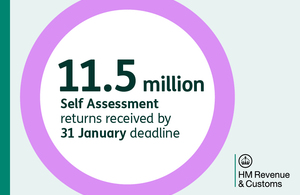A record 11.5 million tax returns filed by the deadline
11.5 million Self Assessment customers submitted their tax returns by the 31 January deadline

A record-breaking 11.5 million taxpayers submitted their Self Assessment tax returns for the 2022 to 2023 tax year by midnight on 31 January, HM Revenue and Customs (HMRC) reveals.
More than 12.1 million taxpayers were expected to file a tax return and pay any tax owed. Of those that met their obligations by the deadline, 778,068 beat the clock to complete it on 31 January, including:
- 61,549 customers who filed between 16:00 and 16:59 – the peak hour for filing
- 32,958 customers who filed between 23:00 and 23:59
HMRC is urging anyone who missed the deadline to submit their tax return now. There is an interactive tool on GOV.UK to help customers with their return. Late filing and late payment penalties are charged for failure to meet the deadline.
Myrtle Lloyd, HMRC’s Director General for Customer Services, said:
Thank you to the millions of Self Assessment customers and agents who met the deadline. Anyone who has yet to file and is concerned that they cannot pay in full may be able to spread the cost of what they owe with a payment plan. Search ‘pay your Self Assessment’ on GOV.UK to find out more.
The Self Assessment payment deadline was also 31 January, and anyone with outstanding tax to pay should do so as soon as possible. There are many ways to pay, including online, using the HMRC app, by bank transfer, or setting up a Time to Pay payment plan. There is a video on YouTube to help customers set up an online payment plan.
How to set up a Time to Pay arrangement online for Self Assessment
A full list of payment options can be found on GOV.UK. There is also a video on YouTube that explains a customer’s Self Assessment tax bill and the different ways to pay.
How do I pay my Self Assessment tax bill?
Customers can plan ahead for their 2023 to 2024 tax bill and set up a regular payment plan to help spread the cost. HMRC’s Budget Payment Plan enables those who are up to date with previous payments to make regular weekly or monthly contributions towards their next tax bill.
A Budget Payment Plan is different from payments on account, which are usually due by midnight on 31 January and 31 July.
Taxpayers who file or pay late but have a reasonable excuse can appeal penalties on GOV.UK. HMRC has published interactive guidance to explain the process and signpost them to the correct course of action.
People should be aware of the risk of falling victim to scams and should never share their HMRC login details with anyone, including a tax agent, if they have one. HMRC scams advice is available on GOV.UK.
Further information
Self Assessment 2024 facts summary:
- 12,187,811 Self Assessment returns due
- 11,581,962 returns received by 31 January. This includes expected returns, voluntary returns and late registrations
- 11,027,962 expected returns received by 31 January
- an estimated 1.1 million customers missed the deadline
- 11,246,962 returns were filed online (97.11% of returns expected, following adjustments)
- 335,000 paper tax returns were filed (2.89% of returns expected, following adjustments)
Voluntary returns/late registrations are an estimate based on returns received by early January and previous filing behaviour.
These figures are indicative and may be subject to further adjustments once all figures have been ratified.
The penalties for filing a tax return late are:
- an initial £100 fixed penalty, which applies even if there is no tax to pay, or if the tax due is paid on time
- after 3 months, additional daily penalties of £10 per day, up to a maximum of £900
- after 6 months, a further penalty of 5% of the tax due or £300, whichever is greater
- after 12 months, another 5% or £300 charge, whichever is greater
There are also additional penalties for paying late - 5% of the tax unpaid at 30 days, 6 months and 12 months. Interest will also be charged on any tax paid late.